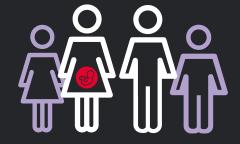Are there risks to my baby?
Most women with epilepsy will have a normal pregnancy and labour. However, women with epilepsy have a slightly higher chance of having a baby with a birth abnormality due to genetic conditions, injury during seizures and anti-seizure medications (ASMs). Talk to your neurologist about how you can reduce the risk to your unborn baby.
Physical birth abnormalities
For any woman there is a small (‘background’) risk that her baby may be born with a birth abnormality or malformation. Physical birth abnormalities are problems that happen when the development of a baby is affected while it is in the womb. There are different types of birth abnormality, which can affect different organs in the body, and can happen for different reasons. Birth abnormalities can be classed as ‘minor’ and ‘major’.
Minor malformations are those that do not need surgery, for example small fingers and toes, and eyes set wide apart.
Major malformations are those that need surgery to correct them. These include a hole in the heart, problems with the kidneys or genitals, cleft lip, and cleft palate (where the roof of the mouth is not correctly joined). They also include problems with the development of the spine and nervous system (neural tube defects), such as spina bifida (where part of the spinal cord is exposed).
Sometimes the child’s arms or legs, or the way their face looks, may also be affected.
If you are pregnant, avoiding the following will all help reduce the risk of birth abnormalities: alcohol, smoking, unprescribed medication, and illegal drugs. This is because all these substances can be passed through your bloodstream to your baby and so may affect your baby’s development.
Women with epilepsy have a higher chance of having a baby with a birth abnormality than women who don’t have epilepsy. This may be due to an underlying genetic condition which also caused the epilepsy. Or risks can be due to injury to your unborn baby if you have seizures during pregnancy, or from taking some types of ASM.
Can ASM affect an unborn baby?
For a woman with epilepsy who takes ASM during pregnancy, her baby will be exposed to ASM in the womb. While she is pregnant, a mother’s bloodstream is kept separate from her unborn baby’s. However, some substances can pass from her blood into her baby’s blood via the placenta. These substances include nutrients, oxygen, alcohol, and medication including ASM.
Some ASMs can affect how the baby grows and develops inside the womb, particularly in the first 12 weeks of pregnancy when the main organs and skeleton are developing.
ASMs and birth abnormalities
Different ASMs vary in the risk they pose, and the risk of birth abnormalities rises with higher doses of the drug, and if you already have a child with a birth abnormality. Taking more than one ASM increases the risks, especially if this includes sodium valproate or topiramate (see below).
- 2 – 3 women in every 100 (2 – 3%) in the general population will have a baby with a major malformation (the 'background risk').
- 3 women in every 100 (3%) who have epilepsy and don’t take ASMs will have a baby with a major malformation.
- 4 – 10 women in every 100 (4 – 10%) who have epilepsy and do take an ASM will have a baby with a major malformation.
- Recent studies carried out by the Commission on Human Medicines (CHM), looking at the risks associated with commonly prescribed ASMs shows that lamotrigine (Lamictal) and levetiracetam (Keppra) are safer to use during pregnancy than other ASMs, having low rates of physical birth abnormalities, in line with the background risk (2 - 3%). Again, for each drug the risks increase with higher doses. The Medicines and Healthcare Products Regulatory Agency (MHRA) has produced more guidance on the risks for ASMs in pregnancy. A further study into Pregabalin was published in April 2022.
Sodium valproate – specific risks in pregnancy
Sodium valproate (brand names include Epilim, Episenta, Epival and Dyzantil) has greater risks in pregnancy than other ASMs, with 7 women in 100 (7%) having a baby with a major abnormality, rising to 1 in 10 women (10%) if they take more than 1000mg (1g) per day.
Also, up to 4 children in 10 (up to 40%) whose mothers took sodium valproate have problems with development and learning.
There is also evolving information about potential risks in men.
The (MHRA) states that sodium valproate should not be prescribed to anyone under the age of 55, unless it is the only effective drug for them, and if they are a woman, they are on a pregnancy prevention programme (see below). They also recommend that treatment with sodium valproate should only be started by a doctor experienced in managing epilepsy.
Sodium valproate is an effective drug for epilepsy and, for some people, it is the best or only drug that controls their seizures.
Whichever ASM you are taking, do not suddenly stop taking it, but talk to your doctor or epilepsy specialist nurse (ESN) about any specific risks, and the best options, for you individually.
Pregnancy prevention programme (PPP)
Current MHRA advice states that sodium valproate must not be prescribed for any woman or girl under the age of 55, unless she has a pregnancy prevention programme (PPP sometimes called PREVENT) in place.
- Your specialist will discuss the risks of taking sodium valproate with you, and whether or not you are planning to become pregnant. This will help to decide if the PPP is right for you.
- They will explain the risks to an unborn child if the mother takes sodium valproate during pregnancy. (See above for risks of taking sodium valproate during pregnancy).
- Before you start to take sodium valproate, you will need to have pregnancy tests.
- Your specialist will explain the options for highly effective contraception.
- Your specialist will carry out reviews of your treatment at least annually. You and your specialist will complete an annual risk acknowledgement form at each review. This confirms that you have been given appropriate advice, which you have understood.
Fetal anti-convulsant syndrome
Some ASMs are thought to affect a child’s development after they are born. This is called Fetal anti-convulsant syndrome (FACS). The risk of this happening appears to be higher with sodium valproate than with other ASMs.
Problems with the child's development and learning can include: delayed walking and talking, poor speech and language, and problems with memory, attention, lower intelligence and behaviour. Often these effects are not seen until the child starts to get older, for example when they start nursery or school.
Children exposed to sodium valproate in the womb may also be more likely to have on the autism spectrum. There are organisations which provide information and support to families affected by Fetal anti-convulsant syndrome:
FACS Association
INFACT
OACS
Topiramate - specific risks in pregnancy
New safety measures have been introduced (June 2024) for the epilepsy medication, topiramate, also known by the brand name Topamax.
The safety measures follow a major safety review triggered by a European study which showed that children born to mothers who take topiramate during pregnancy face a two to three times higher risk of intellectual disabilities, autism spectrum disorders and attention deficit hyperactivity disorder.
The Medicines and Healthcare products Regulatory Agency (MHRA) – the medicines and healthcare regulator – is advising that topiramate should no longer be prescribed for epilepsy during pregnancy unless there is no suitable alternative treatment. If you are a woman or girl of childbearing age taking Topiramate medication:
- You will need to be using effective birth control during treatment and will need to take a pregnancy test before starting treatment. Some birth control methods are less effective than others when using topiramate. You can discuss this with your GP or sexual healthcare practitioner, who will be able to help advise you which form of birth control is right for you.
- Healthcare professionals should discuss the risks associated with the medication with you and ask you to sign a risk awareness form.
- You should have regular medication reviews, at least once annually.
- You should be given new safety and education materials to help explain and support the implementation of these measures. You can read the guide for epilepsy here.
- Your pharmacist will also give you a patient card with information about Topiramate.
Before the review, topiramate was already known to have risks associated with significant harm during pregnancy, including a higher risk of birth defects and low birth weight. For this reason, patients were previously advised against using it during pregnancy and to use highly effective contraception during treatment.
The introduction of the Pregnancy Prevention Programme will further strengthen the safety measures and aim to reduce the number of topiramate-exposed pregnancies.
If you are pregnant, or planning to become pregnant, and you currently take topiramate for epilepsy, you should not stop taking the medication but should seek the advice of a specialist. Stopping medication without supervision may cause your seizures to start again, happen more often or last longer. Anyone planning to start a family should make an appointment with their GP to discuss their treatment options.
A visual warning symbol will be added to the box of all topiramate medicines. This ‘no’ symbol will show a pregnant woman in a red circle with a line through it. This will be accompanied by warning text about the risks.
If you suspect you have had a bad drug reaction with topiramate, you can report this through the Yellow Card scheme.
For more information go to: Topiramate (Topamax): introduction of new safety measures, including a Pregnancy Prevention Programme - GOV.UK (www.gov.uk).
What do these risks mean for me
Most women with epilepsy have over a 90% chance of having a healthy baby. Any individual risks for you will depend on many factors, including your type of epilepsy, the ASMs and dose you take, and any other medical conditions.
If you stop taking your ASMs, your seizures may increase, or become more severe. Seizures may cause more harm for you and your baby than any risks associated with the ASMs themselves.
You and your specialist can discuss any specific risks, and the best options, for you individually.
If you are concerned that your child may have problems caused by anti-seizure medication
If you are concerned that your child or children may have FACS contact your GP or doctor to discuss the issues. You and your GP will be able to look at the medications you were prescribed and the dose you were taking. This will help you to understand whether this could have affected your children. There is no simple test that can confirm a diagnosis of FACS and symptoms can vary significantly from baby to baby. Instead a diagnosis may be reached by eliminating other possible causes. This could include genetic testing.
Your GP will be able to signpost you to your local learning disability team who will be able to identify the right support for your child. If your child is now an adult, your GP will be able to signpost you to the right support.
In addition, if you live in the north of England, your doctor may be able to refer you to the Fetal Exposure to Medicines Service (FEMS) run by Manchester University NHS Foundation Trust. This is a pilot service that provides expert assessment, advice, and care plans for people who have problems that could be from exposure to an antiseizure medicine in the womb.
Further information
National Institute for Health and Care Excellence.
nice.org.uk/guidance/ng217
Guidance on the diagnosis and treatment of epilepsy.
Epilepsy Society is grateful to Dr F J Rugg-Gunn, Consultant Neurologist & Honorary Associate Professor Clinical Lead, Chalfont Centre for Epilepsy, who reviewed this information.
Information updated: August 2024
Download this information
For a printed copy contact our Helpline.
Starting a family
Most women with epilepsy do not have any change in their seizure frequency during pregnancy. However you might find that your seizures are better controlled during pregnancy, or that you have more seizures than is usual for you.
Epilepsy treatment
If you have just been diagnosed with epilepsy, you may have questions about medication and treatment.
Sodium valproate
Sodium valproate is an epilepsy drug prescribed for all seizure types including absence, myoclonus and tonic clonic seizures. New regulations have been introduced by the Medicines and Healthcare products Regulatory Agency (MHRA) around the way in which the drug, sodium valproate is prescribed to women and girls of childbearing age.

Information from the Medicines and Healthcare Products Regulatory Agency
Read information produced by the MHRA around sodium valproate.



